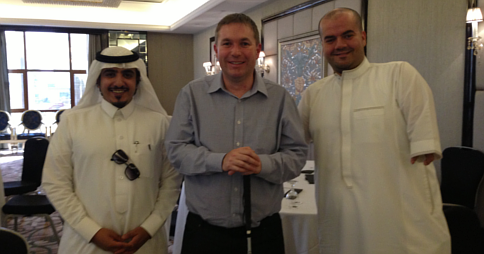Two innovative organisations in the Arabian Gulf have led the charge in building local accessibility knowledge and capacity.

The Middle East is fast becoming a hub for information technology (IT) development and education. Both Qatar and Saudi Arabia have established government-supported organisations to speed up the process and importantly to develop accessibility-related knowledge and skills.
Qatar’s Mada is a well-established government organisation with active training and consultancy programs in web accessibility, in addition to extensive assistive technology programs for people with disabilities.
Tamkeen Technologies, established in 2013 and headquartered in Riyadh, Saudi Arabia, is an organisation owned by multiple Saudi government and private sector organisations. Its role is to serve the needs of government organisations in Saudi Arabia by providing IT and labour market services. Its services include technical consultancy, systems integration and software development, employment services and technical support in information technology. Digital accessibility is recognised as being an essential component of that strategy.
A key requirement for successfully implementing digital accessibility is knowledge on web standards, in particular, the Web Content Accessibility Guidelines (WCAG) 2.0 and the Authoring Tool Accessibility Guidelines (ATAG).
In addition to the need to adopt digital accessibility as a part of IT best practice, both Saudi Arabia and Qatar are signatories to the United Nations’ Convention on the Rights of Persons with Disabilities, which stresses the importance of governments actively working to improve access to IT and communications.
In both cases, Tamkeen and Mada turned to Media Access Australia to deliver specialist training for web accessibility professionals.
Mada opted for a supportive, industry-wide approach providing assistance to local IT companies to enrol staff in the university-accredited Professional Certificate in Web Accessibility. It teaches the essential principles and techniques for achieving accessibility compliance, and enables teams to develop websites that work for more people, including the ageing population.
This strategy allowed a broad range of organisations and local professionals to build accessibility skills and enhance local capacity. Doha-based developer Ryan Chittenden commented that accessibility should be a core part of every developer’s training.
“I totally wish I had a course like this when I was first learning to build websites. Learning these principles so early in your career will lead to a lifetime of better websites. If the new generation of students are accessibility conscious and implement WCAG in every website they build, within one generation inaccessible websites will go the way of the dodo bird.”
Responding to Tamkeen’s need for rapid delivery of the Professional Certificate in Web Accessibility—the course is typically offered over six weeks in an online learning environment—Media Access Australia developed an innovative, intensive format allowing the course to be delivered in just five days onsite in Riyadh. Two of the three course assignments were completed afterwards and submitted online for grading.
The different approaches were tailored to meet the specific needs of the organisations and their stages of accessibility skills development.
The courses were led by Dr Scott Hollier, an international expert on web and digital accessibility. Dr Hollier is also Media Access Australia’s representative on the specialist committees for the W3C, the international standards body for the World Wide Web. He said that practical assessments based on real-world issues are a key feature of the Media Access Australia approach.
“In both cases Media Access Australia’s offering, which can be in delivered in person or online, is instructor-led, provides students with the ability to discuss and reflect on course material, and has practical assignments that are marked by the instructor. These things show a current or potential employer that they really have the skills they need.
“In Qatar there was an already established program and the people doing the course wanted the opportunity to mix with a broad range of web professionals from around the world. With Tamkeen, it was looking to skill up specific people quickly, and the opportunity to have face-to-face training and to be able to interact directly with the experts was a good way to build that knowledge in an environment that suited their needs.”
The next course is running from 10 August. For more information, student testimonials and to enrol, visit the Professional Certificate in Web Accessibility course page.
